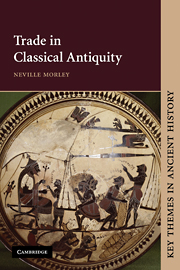2 - Ecology and economics
Published online by Cambridge University Press: 23 December 2009
Summary
Suppose that there is a time of dearth and famine at Rhodes, with provisions being sold at fabulous prices; and suppose that an honest man has imported a large cargo of grain from Alexandria and that to his certain knowledge several other importers have set sail from Alexandria, and that in the course of the voyage he has sighted their vessels laden with grain and headed for Rhodes; is he bound to report this fact to the people of Rhodes, or is he to keep his own counsel and sell his goods at the highest market price?
(Cic. Off. 3.50)From today's perspective, the fact that Cicero can consider that such a situation would ever present a merchant with a moral dilemma seems to epitomise the distance between ancient and modern economic mentality. His stress on the honesty of the man, given the views that he expresses about traders earlier in the same work (1.150–1), is significant; in so far as this thought experiment relates to actual behaviour, it is that of the young Roman noble rather than any merchant. However, the situation in which such a dilemma ought to exist is intended to be believable: it exemplifies not only the ubiquity of food crisis (not necessarily famine: Garnsey 1988: 17–39) and the reliance on imports of grain, but the slowness of transport, the scarcity of information and the volatility of the market.
- Type
- Chapter
- Information
- Trade in Classical Antiquity , pp. 17 - 34Publisher: Cambridge University PressPrint publication year: 2007



